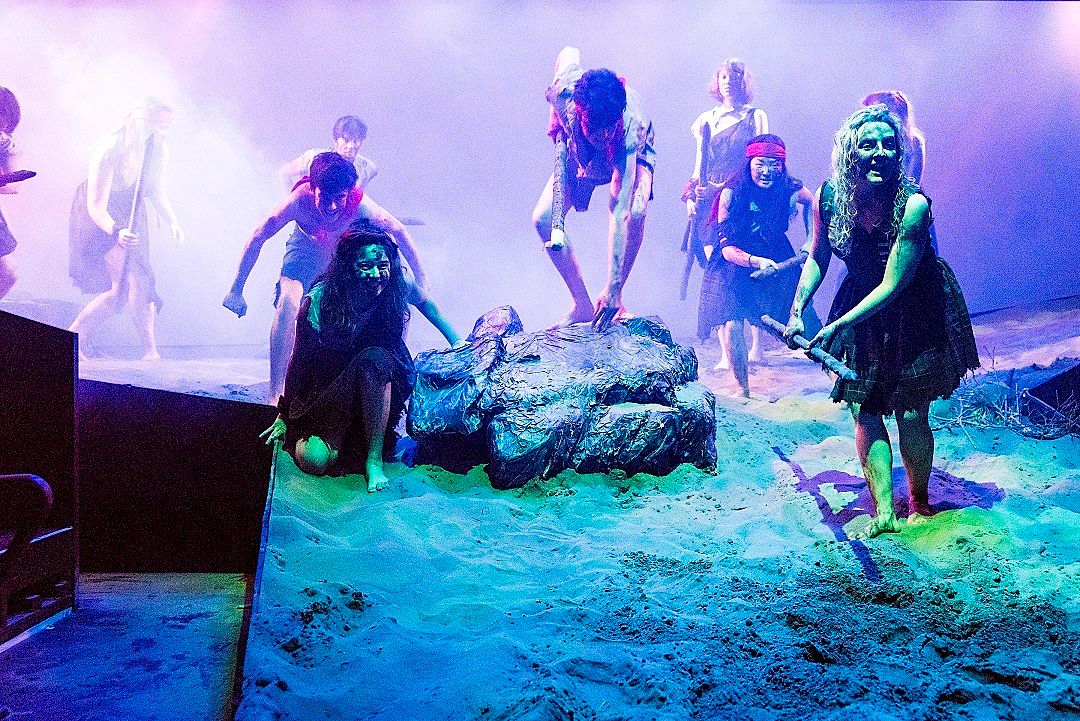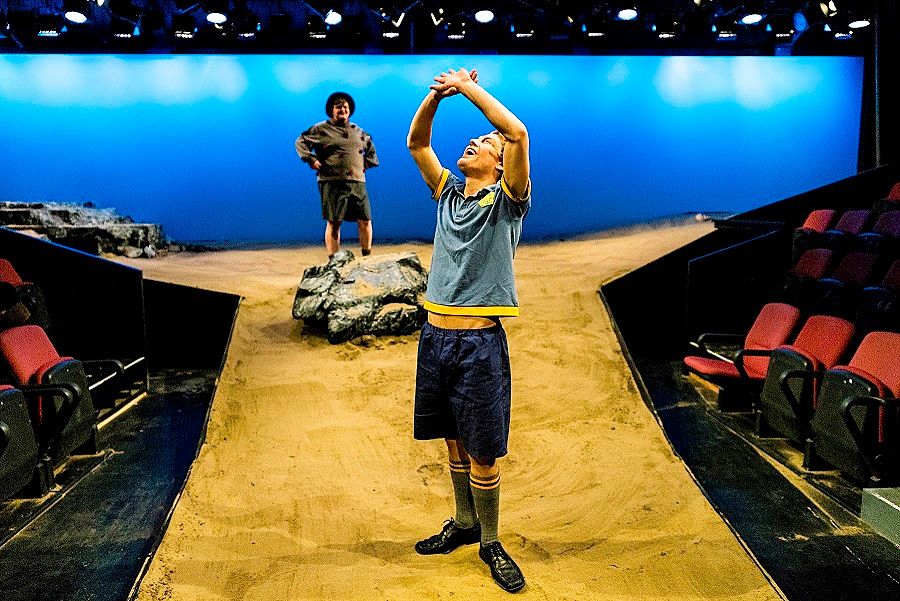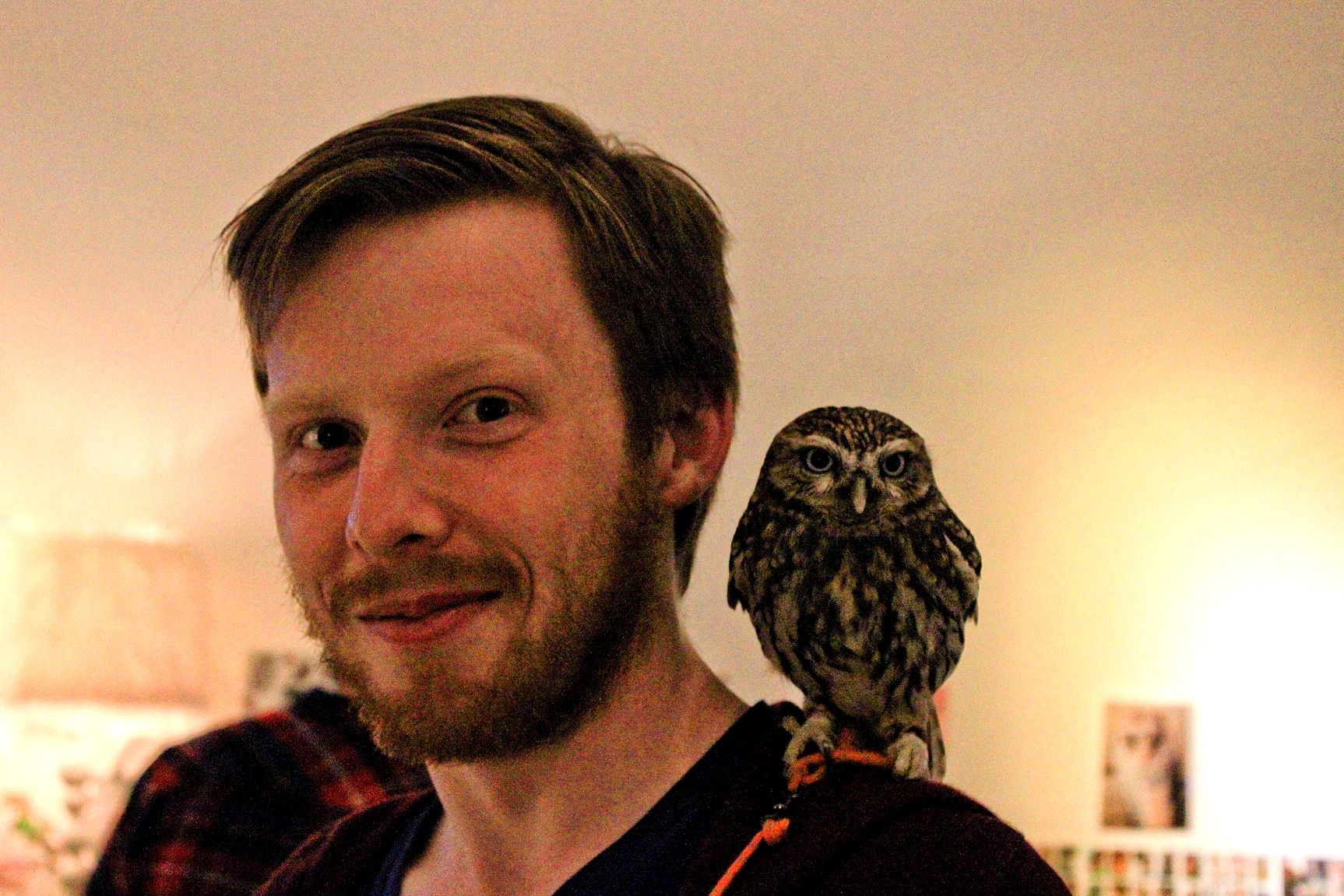Playground Battle: A Review of Lord of the Flies
Centrepoint Theatre's latest Open Stage production tackles a classic tale of children killing each other on an island. Adam Goodall reports from the frontlines.
Centrepoint Theatre's latest Open Stage production tackles a classic tale of children killing each other on an island. Adam Goodall reports from the frontlines.
It’s like an incredible playground built for killing kids in.
The centrepiece of Lord of the Flies’ set, designed by Theo Wijnsma, is a T-shaped series of ramps, drowning in sand. The ramps run by and through the audience, large, flat rocks set into them. The children dart around a series of angled poles in one corner, playing hide and seek, and call out to each other from the highest point of this jungle-themed sandpit, a ‘cliff’ near the theatre entrance. There’s even a ramshackle lean-to at the base of the T, a wendy house of bamboo and leaves.
And there’s this, running the length of the upstage wall, looming over the ramps of sand: a bright, white wall. It hides the action happening backstage and it’s a blank canvas for the lighting, a way of the reflecting garish blues and greens back onto the stage. It’s inelegant, an unflattering solution to a staging problem. It’s also an apt metaphor for Centrepoint Theatre’s production of Lord of the Flies, a show that constantly runs up against the limits of its own vision and takes the path of least resistance when it does.
Jeff Kingsford-Brown, Centrepoint’s outgoing artistic director, takes the reins of this adaptation of William Golding’s classic novel. To those who had to study it in fifth form English, the premise is familiar: British schoolchildren escaping from an endless war crash-land on an isolated Pacific island and come to blows over how best to live on the island, how best to live with each other, and how to deal with the ‘Beast’ that’s in the jungle, stalking them.
What sets this season apart from Centrepoint’s usual programming (and from ATC’s 2013 season of the same adaptation) is that it’s the third production in Centrepoint’s Open Stage initiative. Established under Kingsford-Brown in 2015, the initiative opens up one show in the theatre’s programme each year – Frankenstein in 2015, The Events in 2016 – to community performers and designers. The idea is that Manawatu-based creatives get the opportunity to develop their craft alongside (and with guidance from) industry professionals in the kind of large-scale production that’s becoming a rarity at Centrepoint.
The majority of Lord of the Flies’ 21-strong cast, then, are local teens and twenty-somethings. Their energy is enthusiastic and energetic and never seems to flag. They lunge and scream and throw themselves across the stage as if they were living the play’s life-or-death terrors. They’re not polished, sure – the younger performers often over-enunciate, isolating each syllable like it’s a recitation – but they can’t stop and won’t stop and it’s a pretty infectious energy to be around.
They’re led by a team of five young professional actors, but despite their skill it’s hard to shake the feeling that everyone’s being destabilised by a sometimes inscrutable adaptation and a stubbornly conventional directorial vision. British playwright Nigel Williams’ script is a hazy, nightmarish piece of writing that lurches from one event to the next, blurring time in and around the action so that you never get a handle on when things happen in relation to each other. He seems more interested in getting each boy (and girl – the cast here is gender-mixed, though the names are not) to map for us their growing feelings of resentment, their thirst for power and their understanding of control. The dialogue reads less like dialogue and more like monologues, broken up and delivered over top of each other. The children explore and declare their philosophies regarding life, leadership and the pursuit of happiness, and those declarations are punctuated by violence that illustrates over and over again the allure of strength and certainty, even when that strength is violent and that certainty is drawn from hate.
Nothing’s given a chance to grow or fester. It’s too fast, too punchy, too clean.
It’s a tough script and Kingsford-Brown’s translation, at least initially, is journeyman. Kingsford-Brown doesn’t feel out a natural rhythm for this idiosyncratic dialogue; characters yell into each others’ faces but don’t connect, leaving seconds of dead air between lines. We’re shuttled from action to action without the opportunity to settle into the group dynamics, and rifts don’t grow so much as they appear fully-formed after a flurry of argument. Jack (Ella Hope-Higginson) is visibly attracted to Ralph (Michiel van Echten) one second then disgusted with him the next; her cultish fascism takes hold suddenly and completely and none of the ‘heroes’ are ever truly tempted by it. Nothing’s given a chance to grow or fester. It’s too fast, too punchy, too clean.
Whether or not this is accurate to Golding’s book is beside the point. The point is that this isn’t an especially interesting vision for this script – or in this global political moment. Hope-Higginson is ravenous and exciting when she’s whipping up paranoia about the Beast and revealing the extent of her quasi-religious zealotry. Nathan Mudge, playing her sadistic right hand Roger, is full-body violent, switching up his volume and tone like a corrupted MP3. But their ‘savagery’, as Piggy and Ralph and Simon call it, is unambiguously evil. They’re the selfish and hateful side of a divide with contemporary resonance, but their scenery-chewing villainy is old-fashioned.
The other side of the rift is harder to get your head around, not necessarily by design. Here, Ralph, Piggy and scientific Simon aren’t defenders of the rule of law so much as they are technocrats, teen jobsworths who struggle to communicate the value of democracy. Their failure to make that connection is explicit: Jack’s sudden embrace of fascism is a direct result of Ralph failing to explain why meetings and talking rights are a good thing to have.
So Comfrey Sanders’ Simon pulls at her fingers and agonises over the way forward, relaxing and tensing as she tries and fails to deal with all this anarchy. So Leighton Stitchbury throws shade like it’s going out of fashion, a Piggy with nothing but contempt for people he’s already (and rightly) assuming are bullies. So van Echten assumes his duties like a student who’s been made prefect to teach him responsibility, hectoring and pleading with the kids he’d really rather be hanging out with. Sanders is the only one who feels at home in her character, though. van Echten pushes every line read, trying a bit too hard to seem chill. Stitchbury walks around and grabs at things – his glasses, the conch – in a weirdly infantile manner, like a preschooler trying to protect his toys.
After Simon’s brutal murder at the hands of Jack’s fucked-up choir, Lord of the Flies slows down a lot, developing into something more natural to the play’s dreamlike language and pacing. Josh Finegan’s score gets fidgety and dissonant, electronic staccato skittering over the top of a soft, Eno-esque synth. Tanya Pilcher’s lighting design is darker and more lurid, like the island is a neon-lit back-alley in a bad part of the city. Rachel McLean steals scenes as Henry, a choir member who starts to see through Jack’s rhetoric, going rigid when she witnesses violence she’d never have accepted in her old life. Stitchbury’s Piggy drops his snarky elitism, instead making tired, angry demands that his persecutors just see him as human for once.
But even then there are parts of Lord of the Flies that are unambitious, inelegant. The choir isn’t given much opportunity to move as a group and show us how much of a cult they are. They jump around like animals once or twice but too often they’re standing around, just adding volume. Costumes are ripped to show that everyone’s been through some shit, but there’s a clean oval hole in Ralph’s shirt, as if the only shit he’s seen is the tailor. And Kingsford-Brown never critically engages with the script’s racist undertones.
The book’s more overt racism has been excised (Piggy never uses the n-word) but the ‘good guys’ are constantly calling Jack and Roger ‘savages’ in the old-school colonial sense of the word. The kids’ descent, too, is ultimately marked by the same appropriative signifiers of 1950s boys’ annuals - all whooping war-dances and ‘tribal’ facepaint. Some of this you can’t avoid – you’d be hard pressed to stage this story without including the ‘blooding’ of the choir – but there needs to be an effort to answer it, or at least address it. You can’t just fall back on those old tropes of what ‘savagery’ looks like and call it a day.
Imperialist hangovers aside, Lord of the Flies is still incendiary and incredibly relevant. All over the world, violent nationalist rhetoric is steamrolling social norms and leaving ‘civilised’ centrism looking weak and ineffectual. Lord of the Flies describes a world we live in and, pessimistic though it is, demands that we talk about it and push back against hate and otherisation, even if pushing back is hard (and it’s always hard). Kingsford-Brown’s swansong is solid and entertaining, but this is a vital story and a provocative programming choice. It needs to be met with a vital and provocative vision. This isn’t that vision.
Lord of the Flies runs from 15 July to 5 August at Centrepoint Theatre, Palmerston North.
Tickets available here.



